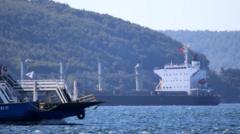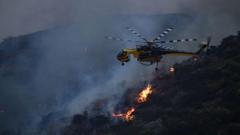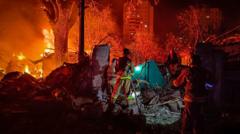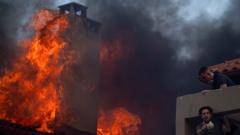As summer temperatures soar, a wildfire swept through the coastal towns of Palaia Fokaia and Thymari, resulting in the destruction of homes and prompting evacuations. Local residents and authorities battled the flames, which were exacerbated by strong winds. With emergency alerts issued and additional firefighters on standby, the region faces an ongoing threat of wildfires.
Devastating Wildfire Ravages Coastal Towns in Greece
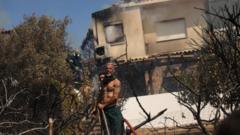
Devastating Wildfire Ravages Coastal Towns in Greece
A fierce wildfire has destroyed homes and forced evacuations in Greece, marking a grave start to the summer fire season.
A large wildfire has caused significant destruction in the coastal towns of Palaia Fokaia and Thymari, situated approximately 40 km (25 miles) southeast of Athens. The flames initially erupted in low-lying vegetation but rapidly spread into residential areas due to a severe heatwave, with temperatures soaring to 40°C. Local officials reported that at least 20 homes have been destroyed and many others have incurred structural damage.
Efforts to combat the blaze included the mobilization of local residents alongside firefighters, forest rangers, and aerial units. The coast guard also played a critical role in safeguarding the coastline. Emergency alerts were dispatched through the 112 system, advising residents to evacuate preemptively from the affected towns and villages.
In response to the increasing frequency of wildfires, Greek officials have significantly bolstered their firefighting resources this summer, deploying an additional 18,000 firefighters, supported by volunteers, for the remainder of the fire season which runs until October. Earlier in the week, thousands of hectares on Chios, one of Greece's major islands, were consumed by flames, with a Georgian woman now under arrest for allegedly starting a fire by discarding a cigarette.
Witnesses in Thymari recounted harrowing experiences as they attempted to reach their homes, only to find them already engulfed in flames due to the strong winds. As the fire escalated further towards Cape Sounion on the tip of the Attica peninsula, officials evacuated over 1,000 people. Eleven tourists were rescued from a beach after becoming trapped by the approaching fire.
Despite evacuation orders, some residents chose to stay and protect their homes using makeshift tools like garden hoses, a decision that officials warned posed significant risks for their safety and hindered emergency efforts. Reports from Greek state broadcaster ERT indicate that police successfully rescued at least 40 individuals, including vulnerable children and elderly residents, from danger.
Fire Service representative Vasileios Vathrakogiannis confirmed that firefighters were engaged in an intense struggle against the wildfire, especially in areas adjacent to residential zones. Local deputy mayor Babis Galanis described the situation in the inland villages as exceedingly challenging, stating that all municipal facilities were made available to those seeking shelter or medical assistance.
In light of the severity of this incident, the head of Greece's fire service has initiated an arson investigation unit to assess whether the blaze was deliberately ignited. According to the Greece Risk Assessment Committee, extremely high temperatures are anticipated for the coming days, with a heightened risk of wildfires in the regions of Attica, Evia, the Peloponnese, and the northern Aegean islands.



